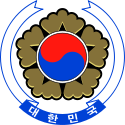- Sixth Republic of South Korea
-
Sixth Republic of South Korea Hangul 제6공화국 Hanja 第六共和國 Revised Romanization Je-yuk Gonghwaguk McCune–Reischauer Che-yuk Konghwaguk South Korea 
This article is part of the series:
Politics and government of
South KoreaGovernment National Assembly
political parties
GNP · DEP · LFP · FHA · DLP · PPP · NPPElections Presidential elections
1997 • 2002 • 2007Legislative elections
2000 • 2004 • 2008Local elections
2002 • 2006 • 2010By-elections
2011Related topics Korean reunification
Sunshine Policy
Administrative divisions
Human rights
Foreign relations
The Sixth Republic of South Korea is the country's present-day government. It began in 1987, with the transfer of power from the authoritarian Fifth Republic of Chun Doo-hwan.
In 1987, Roh Tae-woo, one of Chun's colleagues in the 1979 coup, was elected president by popular vote.
In 1992, Kim Young-sam was elected president. He was the country's first civilian president in 30 years.
In 1997, the nation suffered a severe financial crisis, from which it has now fully recovered. South Korea has also democratized its political processes. This was the first transfer of the government between parties by peaceful means. Kim Dae-jung pursued a "Sunshine Policy" to reconcile with North Korea, culminating in the summit with North Korean leader Kim Jong-il, for which Kim Dae-Jung was awarded the Nobel Peace Prize in 2000. However, the efficacy of the Sunshine Policy was brought into question amid allegations of corruption.
Roh Moo-hyun was elected to the presidency in 2002. On 12 March 2004, the South Korean National Assembly (Parliament) voted to impeach President Roh Moo-hyun on charges of corruption and political patronage. The Uri Party, which solely supported the President, angrily boycotted the vote. This motion clearly affected the outcome of the parliamentary election held on 15 April 2004, in which the Uri Party won 152 seats from the total of 299 seats in the National Assembly.
For the first time in 18 years the ruling party became the majority in the House. This was arguably the first time in more than 40 years that a liberal party has held a majority in the Assembly. However, the Uri Party suffered several electoral setbacks thereafter.
Division into the government in Sixth Republic
- Roh Tae-woo government (was officially called the Sixth Republic) (1988–1993)
- Civilian government (1993–1998)
- Government of Nation (1998–2003)
- Participation government (2003–2008)
- Lee Myung-bak government (2008 – present)
See also
History of South Korea USAMGIK · First Republic · Second Republic · Military rule · Third Republic · Fourth Republic · Fifth Republic · Sixth Republic
Categories:- 1987 in South Korea
- 1987 establishments
- History of South Korea
- 20th century in South Korea
- 21st century in South Korea
Wikimedia Foundation. 2010.
